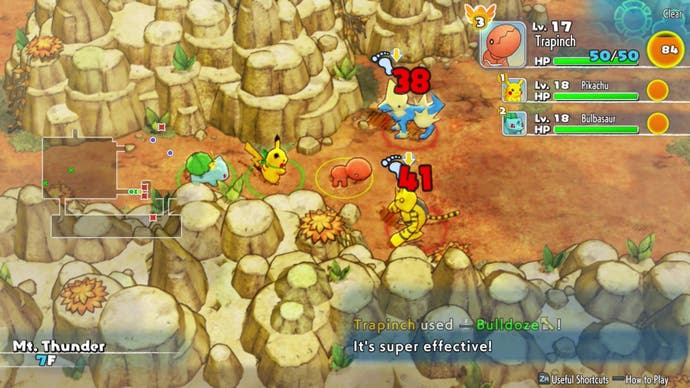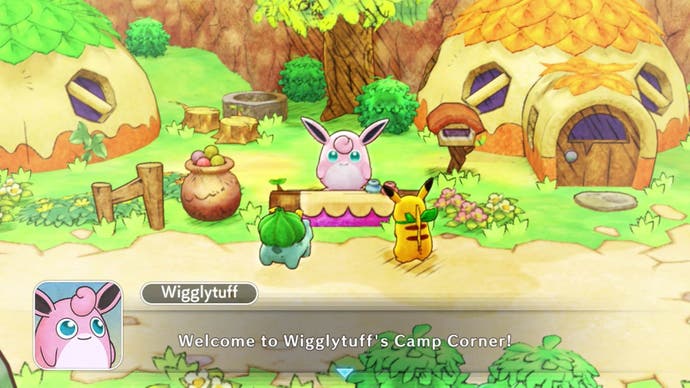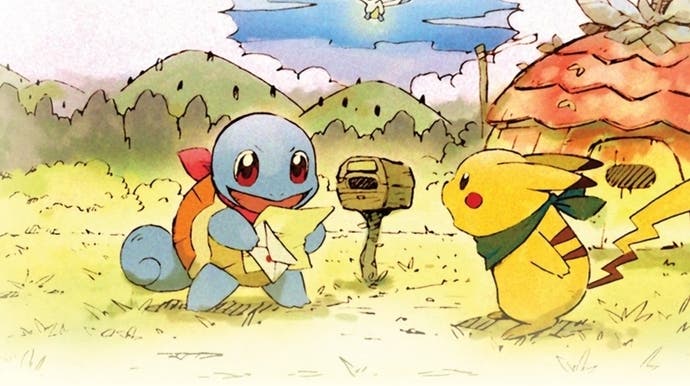Pokémon Mystery Dungeon DX review - a sweet but clumsy remake
Not for Slakoth trying.
I am trying to think of what game it was that Pokémon Mystery Dungeon DX reminds me of and honestly, I just cannot remember. Which is apt! Or we'll make it apt anyway, if you'll bear with me. It's apt because Mystery Dungeon is one of those dreamy, trancelike, somewhat transient games. A playable hypnagogia daydream: all quite pleasant while you're there but then as soon as you leave, poof! It's gone from memory.
Much of that dreaminess comes from a fairly obvious source. Mystery Dungeon DX is a remaster of the Pokémon Mystery Dungeon Blue Rescue Team and Red Rescue team games that came out in the early noughties, and one of DX's headline revisions is how it looks. The pixel art is gone, replaced with a kind of watercolour splash, and as such you're reminded, a bit, of that classic quest in Oblivion (no that's not the game I was thinking of) where you're stuck inside a painting. Then there's the fact you are literally a human trapped inside the body of a Pokémon, and that you keep having these rather disturbing dreams, and all the contrast and saturation seems to be dialled-up beyond the natural average, and yes. A dream. Slightly magical, slightly unsettling, a tiny bit forgettable, and at the same time a tiny bit of it will be burned into your mind's eye.
The setup is all very typical for the mystery dungeon crawler. There's a central town hub, which is small but full of endearing Pokémon roaming around or managing one of a handful of important shops, and then there are the dungeons that you visit for the actual quests. These dungeons have random layouts each time you visit, with wild Pokémon that attack, various traps and obstacles, items to collect, and a friendly Pokémon in need of rescue. The nuance comes in how you manoeuvre your party of Pokémon through the dungeons, ordering them in specific ways for specific circumstances, and in how you manage your inventory, trading off between items you want to keep with you and space for picking up more.
It's a departure from the main Pokémon games, of course, but there are actually more similarities there than you'd think. The combat is turn-based and quite strategic, a mixture of the four-move, rock-paper-scissors familiarity of the main games and a bit of XCOM, if anything, in the importance of positioning and range. Your inherent knowledge of type matchups, utility moves, status effects and all of that will remain incredibly useful - although Mystery Dungeon kindly indicates what moves are super effective and what aren't through its UI - but you'll need to think further ahead and in a greater number of dimensions for success. Everything in the dungeon moves when you move, so while it feels real-time it's really turn-based through and through, and as you get further into the game, where the puzzles get more elaborate and the enemies tougher, plotting your way through can become a genuinely interesting challenge.
You'll also still be collecting Pokémon as you go, although there's a twist to how that works, too. If you beat a Pokémon in a dungeon there's a random chance they'll want to join you, tagging along for the rest of the quest and, at the end of it, being able to join you as a squad option permanently - likewise for those issuing the quests too. But for them to join you, you need to have unlocked the right "camp", which costs coins, which you need to visit more dungeons to earn, where you'll meet more Pokémon that need you to have unlocked other camps, and so on. The salient point really, though, is that you are just a bunch of swell guys and everyone wants to hang out with you.

This also amounts to most of Mystery Dungeon DX's plot. Your pal - who you choose at the start but obviously it's Psyduck - knows you're a human but still wants to help you out. There are rival rescue teams, that often face off in these sort of West Side Story diss battles (you don't actually battle them that often), and there are legendaries, which seem to be pulling the strings in their classic mortals-caught-amongst-quarries-of-the-gods fashion. It's delivered with genuine warmth and abundance of heart, and actually does a better job of staving off the excessive tweeness than the recent mainline Pokémon games.
The problem, though, is that above the warm and fuzzy feeling it might give you, there isn't a huge amount more that Pokémon Mystery Dungeon DX has to offer. The complexity of its dungeon crawling is undoubtedly the big selling point but there's as much frustration to be had there as there is depth. The movement with the analog stick of the Switch is incredibly clumsy - you'll often overshoot steps or go slightly either side of diagonal, if you're anything like me, which is a real problem as you progress to more complex dungeons where precision counts - and with the D-pad, which it was originally built around, it can be painfully finickity. There's no way to know your enemy's stats - even their current or maximum HP - as far as I can tell, which makes advanced planning and strategy almost impossible. And the constant depositing and withdrawing of items and money combined with the blind chance of which Pokémon might want to join you - and which camps you need to unlock in advance for them to do so - inevitably leads to frustration. It's no fun to find a cool, rare Pokémon that wants to join you, but have no way for them to do so because you didn't spend your paltry coin on the right one of several dozen camps ahead of time.

Along with that, there's just the sheer repetition of the dungeons and the moment-to-moment grind that gets a bit much. Although the dungeons change each time you enter, you're fundamentally doing the exact same thing each time you go in, and without those necessary bits of information about enemies and the like it can become an incredibly passive experience - exemplified by the addition of an "auto mode", where your team runs around looking for the next item without you even needing to do anything. There's absolutely an endearing charm to the characters - Pokémon's had that locked down for decades - and the cutesy town will scratch the Animal Crossing itch for a short while, but it will only be for a short while. And although the crawling combat is undeniably moreish, the patterns of play lining your mind like a novel sort of Tetris effect, it doesn't seem moreish for any good reason. It's busywork, really, for idle thumbs and idle minds. Pleasant enough as a daydream, but not one I'd love to be stuck in for any great length of time.










